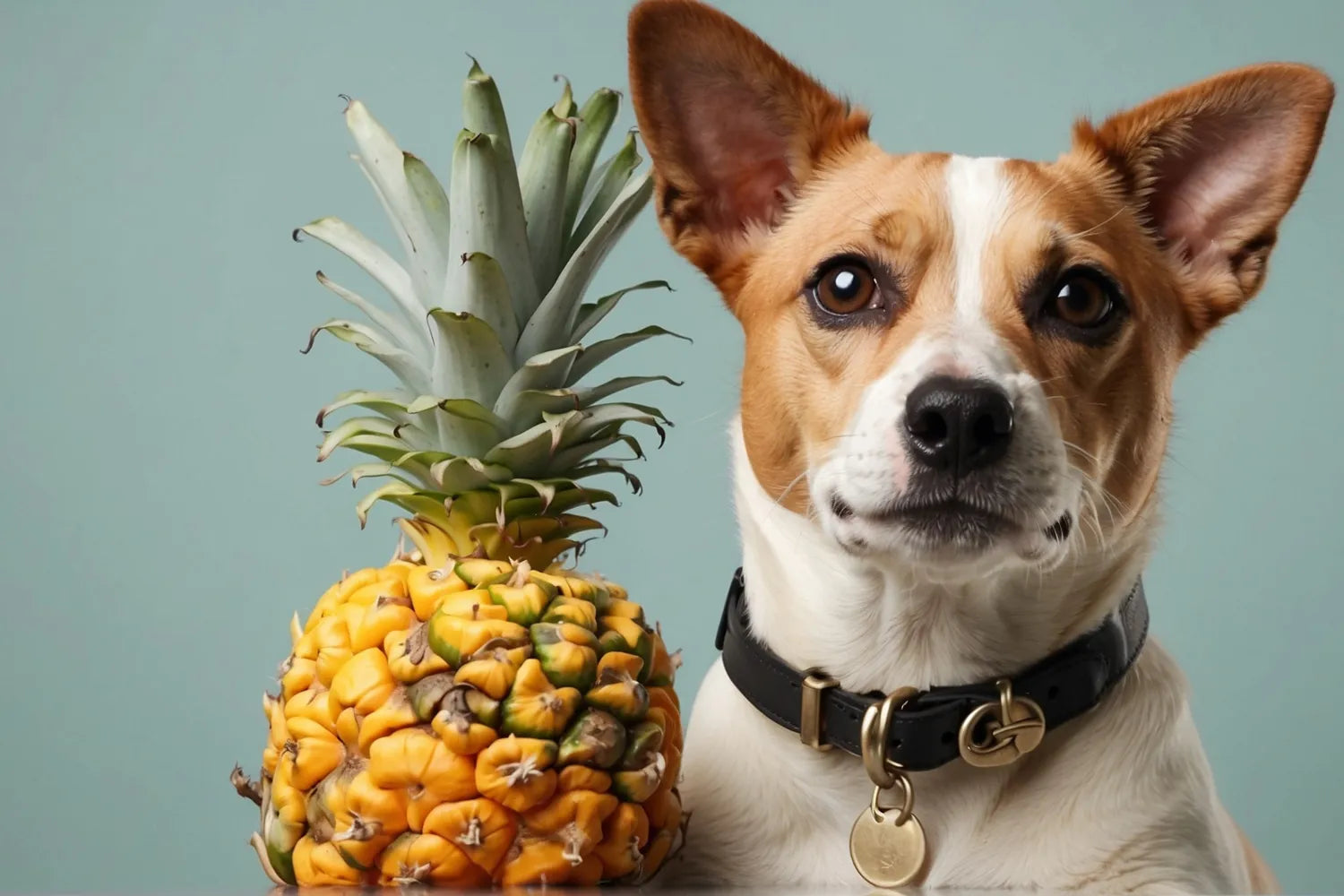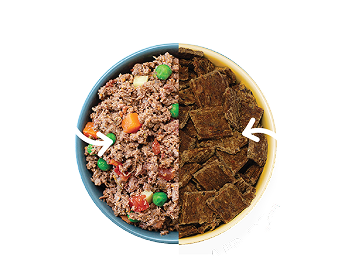
Can Dogs Eat Pineapple? Is Pineapple Healthy for Dogs?
As dog parents, we often find ourselves sharing moments and meals with our dogs. But when it comes to treats like pineapple, it's natural to pause and wonder: can our dogs enjoy this tropical fruit just as we do?
In this article, we're peeling back the layers on pineapple to better understand if it’s okay for our dogs. So, if you've ever pondered whether this sweet, tangy fruit is safe for your pup — keep reading.
What Exactly Is Pineapple?
Imagine a sun-soaked field in some tropical paradise — there, you'll find the pineapple, not growing on a tree, but from a leafy plant close to the ground. Each plant gifts us just one pineapple per season.
This quirky fruit is technically a bunch of berries that have teamed up to form the spiky, golden spectacle we love. Inside that rugged exterior lies juicy, vibrant flesh that dances the line between sweet and tart. It's a real globe-trotter, starting its journey in South America and now popping up in warm locales worldwide.
Can Dogs Eat Pineapple?
Absolutely! Pineapple isn’t only safe for dogs but can be a delightful treat for your pup in moderation. However, it's important to stick to fresh pineapple. The canned stuff is not so great for your dog due to its high sugar content and preservatives.
When feeding pineapple to your dog, always remove the tough, spiky skin and the core. These parts are difficult to digest and could cause intestinal blockages. So, a few bite-sized chunks of the juicy flesh is the way to go.
What Are the Benefits of Pineapple for Dogs?
Pineapple isn't just a tasty snack — it's also packed with nutrients for your dog. This tropical treat offers numerous health benefits that can contribute to your pet’s overall well-being.
Here’s a breakdown of the key advantages:
Vitamin C Boost
Pineapple is a fantastic source of vitamin C, a potent antioxidant that can help support your dog's immune system. Regular intake of vitamin C supports their body’s natural defense against free radicals.
Manganese for Metabolism
This essential mineral plays an important role in energy production, protein and carbohydrate absorption, and the synthesis of fatty acids. Manganese helps keep your dog’s metabolic processes ticking, ensuring they have the energy they need for play and exercise.
Rich in Thiamin
Also known as vitamin B1, thiamin is great for supporting heart health and nervous system function. It helps convert carbohydrates into energy, ensuring your dog remains active and healthy.
Bromelain Enzyme
Pineapple contains bromelain, an enzyme that aids in the digestion of proteins. This can be particularly beneficial for dogs with tricky digestive systems. Additionally, bromelain has soothing properties that can help soothe swelling and discomfort, particularly in older pups with joint issues.
Hydration Helper
With its high water content, pineapple is a juicy treat that helps keep your pup hydrated on hot days. Proper hydration is essential for maintaining healthy kidney and digestive functions.
Fiber for Digestive Health
The dietary fiber found in pineapple helps regulate your dog’s bowel movements and can contribute to a healthy digestive tract. Fiber also promotes a feeling of fullness, which can prevent overeating and help manage weight.
How Do I Introduce Pineapple to My Dog?
Introducing pineapple to your dog's diet should be done thoughtfully and gradually to ensure it suits their digestive system and they enjoy it without any issues.
Here are some tips to help you incorporate this tropical fruit into your dog's routine smartly:
Start Small
As with any new food, start with a small amount of pineapple. A few small pieces are enough to see how your dog reacts. This can prevent any potential digestive upset and makes it easier to identify any allergies or sensitivities.
Proper Preparation
Before offering pineapple to your dog, peel it thoroughly and remove the core. The soft, juicy flesh is easier for dogs to chew and digest. Cut the pineapple into bite-sized pieces appropriate for your dog’s size to avoid choking hazards.
Monitor Their Reaction
Watch for any unusual signs after they eat pineapple, such as lethargy, diarrhea, or vomiting. While rare, some dogs may not handle new foods as well as others. If any of these symptoms occur, discontinue and consult your veterinarian.
Mix With Their Meals
If your dog enjoys pineapple and you've confirmed they can digest it well, consider adding it to their meals occasionally. For a balanced diet infused with the goodness of pineapple, try our Porky’s Luau.
It’s crafted with ingredients like pineapple for that extra zing, plus turmeric, thyme, and parsley to boost the health benefits — just a perfect way to elevate your pup’s diet subtly and deliciously.
Hydration Check
Pineapple contains a lot of water, which is great for hydration, especially on warm days. Still, ensure your dog has continuous access to fresh water, as some dogs might find pineapple slightly tangy, which could increase their thirst.
Use as a Training Reward
If your pup responds well to pineapple, it can be a high-value treat during training sessions. Its sweet taste makes it an excellent occasional reward for positive reinforcement training.
Consult Your Vet
If you’re unsure about the quantities or frequency of feeding pineapple to your dog or if your dog has specific health issues, a quick chat with your vet can provide personalized guidance tailored to your pet's needs.
Beyond Pineapple: Other Dog-Friendly Fruits
Pineapple isn't the only fruit that can add a splash of variety and nutrition to your dog's diet. There's a whole world of dog-safe fruits out there that can provide similar benefits.
Here's a look at some other fruits you might consider incorporating into your dog's snack time for a healthy and tasty change:
- Apples: A great source of vitamins A and C, apples also offer fiber which can aid your dog’s digestion. Just be sure to remove the seeds and core before sharing with your dog.
- Blueberries: Known for their antioxidant properties, blueberries can help support your dog’s immune system while providing a low-calorie treat. They're also handy for training exercises due to their small size.
- Watermelon: With its high water content, watermelon is a fantastic choice for hydration on hot days, much like pineapple. It's also packed with vitamins A, B6, and C but remember to remove all seeds and the rind to prevent any health risks.
- Strawberries: Rich in fiber and vitamin C, strawberries can be a sweet treat for your dog in moderation. They also contain an enzyme that can help your dog's teeth as they eat.
- Bananas: Offering potassium, vitamins, biotin, and fiber, bananas are a soft and easy-to-digest treat for pups. However, due to their higher sugar content, they should be given sparingly.
As always, fresh and properly prepared is best, ensuring you’ve removed any seeds, stems, or pits that could pose risks to your dog. And remember, while fruits can provide added nutrients and variety to a dog’s diet, they should not replace a balanced dog food meal plan. Keep fruits as a complement to their regular diet, and enjoy watching your pup savor these juicy delights!
The Wrap Up
Wrapping up, it's clear that pineapple can be a fun and nutritious addition to your dog’s diet. Just like us, our canine companions can enjoy a variety of foods, provided they're introduced in a safe and thoughtful way.
At A Pup Above, we're committed to creating meals that aren't just delicious but also pack a nutritional punch, all while using human-grade ingredients prepared in our trustworthy sous-vide process. This ensures every bite is as safe as it is scrumptious.
Whether it’s integrating fruits like pineapple into their snacks or serving up a plate of our balanced, sous-vide dog food, we believe in nourishing our pets with the best.
Here’s to happy, healthy eating for our dogs.
Sources:
Pineapple Plant and Fruit | Britannica
Top Stories

Why Do Dogs Lick Their Paws?

Why Do Dogs Whimper & Make Noises in Their Sleep?

Healthy Vet-Approved Homemade Dog Food Recipes

How To Cook Sweet Potatoes for Dogs






















